
The black swan is a large waterbird, a species of swan which breeds mainly in the southeast and southwest regions of Australia. Within Australia, the black swan is nomadic, with erratic migration patterns dependent on climatic conditions. It is a large bird with black plumage and a red bill. It is a monogamous breeder, with both partners sharing incubation and cygnet-rearing duties.

The brolga, formerly known as the native companion, is a bird in the crane family. It has also been given the name Australian crane, a term coined in 1865 by well-known ornithologist John Gould in his Birds of Australia.

The Pomeranian is a breed of dog of the Spitz type that is named for the Pomerania region in north-west Poland and north-east Germany in Central Europe. Classed as a toy dog breed because of its small size, the Pomeranian is descended from larger Spitz-type dogs, specifically the German Spitz. It has been determined by the Fédération Cynologique Internationale to be part of the German Spitz breed; and in many countries, they are known as the Zwergspitz.
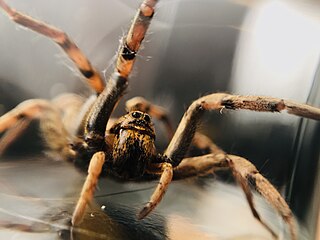
Wolf spiders are members of the family Lycosidae. They are robust and agile hunters with excellent eyesight. They live mostly in solitude, hunt alone, and usually do not spin webs. Some are opportunistic hunters, pouncing upon prey as they find it or chasing it over short distances; others wait for passing prey in or near the mouth of a burrow.

The golden pheasant, also known as the Chinese pheasant, and rainbow pheasant, is a gamebird of the order Galliformes and the family Phasianidae (pheasants). The genus name is from Ancient Greek khrusolophos, "with golden crest", and pictus is Latin for "painted" from pingere, "to paint".

The black-tailed godwit is a large, long-legged, long-billed shorebird first described by Carl Linnaeus in 1758. It is a member of the godwit genus, Limosa. There are four subspecies, all with orange head, neck and chest in breeding plumage and dull grey-brown winter coloration, and distinctive black and white wingbar at all times.

The lesser crested tern is a tern in the family Laridae.
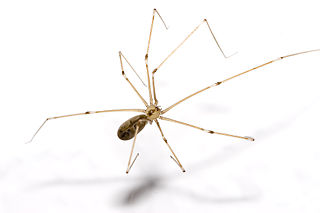
The Pholcidae are a family of araneomorph spiders. The family contains more than 1,800 individual species of pholcids, including those commonly known as cellar spider, daddy long-legs spider, carpenter spider, daddy long-legger, vibrating spider, gyrating spider, long daddy, and skull spider. The family, first described by Carl Ludwig Koch in 1850, is divided into 94 genera.

The orange-bellied parrot is a small parrot endemic to southern Australia, and one of only three species of parrot that migrate. It was described by John Latham in 1790. A small parrot around 20 cm (8 in) long, it exhibits sexual dimorphism. The adult male is distinguished by its bright grass-green upper parts, yellow underparts and orange belly patch. The adult female and juvenile are duller green in colour. All birds have a prominent two-toned blue frontal band and blue outer wing feathers.

The sooty oystercatcher is a species of oystercatcher. It is a wading bird endemic to Australia and commonly found on its coastline. It prefers rocky coastlines, but will occasionally live in estuaries. All of its feathers are black. It has a red eye, eye ring and bill, and pink legs.
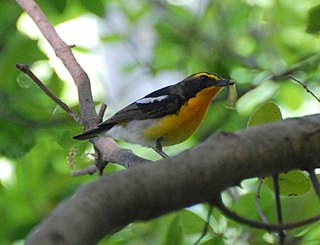
The narcissus flycatcher is a passerine bird in the Old World flycatcher family. It is native to the East Palearctic, from Sakhalin to the north, through Japan across through Korea, mainland China, and Taiwan, wintering in southeast Asia, including the Philippines, Vietnam and Borneo. It is highly migratory, and has been found as a vagrant from Australia in the south to Alaska in the north.

The smooth toadlet is a species of Australian ground-dwelling frog native to the coast and west of the ranges of south-east Queensland, all of eastern New South Wales and north-eastern Victoria.
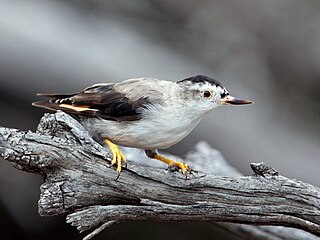
The varied sittella is a small, around 10–11 cm long, songbird native to Australia. It is also known as the Australian nuthatch, orange-winged sittella and the barkpecker.

A tabby is any domestic cat with a distinctive 'M'-shaped marking on its forehead; stripes by its eyes and across its cheeks, along its back, and around its legs and tail; and, characteristic striped, dotted, lined, flecked, banded, or swirled patterns on the body—neck, shoulders, sides, flanks, chest, and abdomen. "Tabby" is not a breed of cat, but a coat type seen in almost all genetic lines of domestic cats, regardless of breed.

The red-collared lorikeet is a species of parrot found in wooded habitats in northern Australia. It was previously considered a subspecies of the rainbow lorikeet, but today most major authorities consider them as separate species. No other member of the rainbow lorikeet group has an orange-red collar over the nape.

The black-chinned honeyeater is a species of passerine bird in the family Meliphagidae. It is endemic to Australia. Two subspecies are recognised. Its natural habitats are temperate forests and subtropical or tropical dry forests.
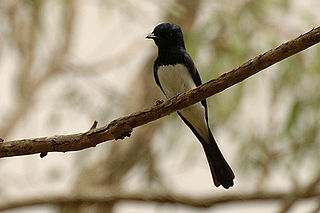
The satin flycatcher is a species of bird in the family Monarchidae. Males stand out with their blue-black feathers contrasting their white bellies, and the females with their bright orange throats. It breeds mostly in south-eastern Tasmania and Australia. It is declining throughout the eastern seaboard due to predation from the introduced Red Fox and habitat loss. It is a vagrant to New Zealand.

The black-fronted bushshrike is a passerine bird of the bushshrike family, Malaconotidae. It inhabits forests mainly in East Africa. It forms a superspecies with the many-colored bushshrike and the two are sometimes considered to be a single species.

Last Girl on Earth was the third concert tour by Barbadian recording artist Rihanna. The tour visited Europe, North America and Australia to support her fourth studio album, Rated R (2009).

Harpobittacus is a genus of hangingfly of the family Bittacidae found in Australia.




















